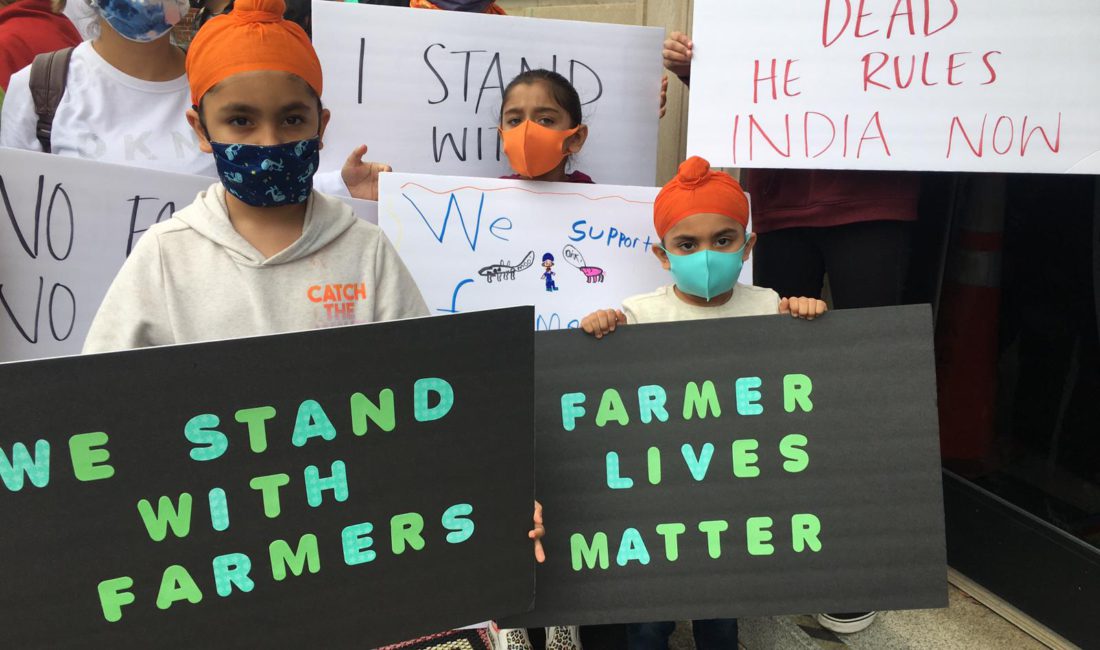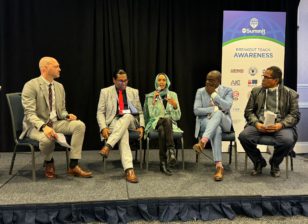Hundreds of Indian Americans protest across United States, demanding repeal of farm laws as well as CAA
FOR IMMEDIATE RELEASE
December 15, 2020
The “Coalition to Stop Genocide in India”, a broad coalition of Indian American and US-based civil rights organizations organized protests on December 12, 13 and 15, in several cities across the US demanding repeal of the pro-corporate farm laws as well as the draconian Citizenship Amendment Act (CAA) and the National Register of Citizens (NRC).
The protests were organized in Austin, Atlanta, Dallas, Boston, New York City, Raleigh, Seattle, Chicago and several other cities by the diaspora community and the coalition partners included the Indian American Muslim Council (IAMC) and the Boston South Asia Coalition (BSAC).

The protests were attended by hundreds of Indian Americans who braced freezing temperatures in some cities to express solidarity with protesting farmers and citizens in India. Loud cries of ‘Sadda Haqq ithe rakh’ (Give us back our rights) and ‘No Farmer, No Food’, rang out at the Dallas City Hall in Texas, the venue of protests by members of the Sikh community, to support the ongoing farmer protests in India. The severe cold and steady rainfall could not keep the determined lot from registering their protest against the farm laws which are expected to have a crippling effect on an estimated 16 million farmers and a couple million traders associated with agriculture across the country.
The protesters highlighted that the farm laws which the Modi government passed would shrink farmers’ income by doing away with the minimum support prices (MSP) fixed by the government, and would leave them at the mercy of corporates.“The Modi government has proven to be the most anti-farmer regime in the history of India. The demonetization devastated the farmers badly, and Modi’s economic policies have enabled exponential increase in the wealth of billionaires and big business at the expense of the common public,” said Mohammed Jawad, National General Secretary of IAMC.
“The new farm laws were not only anti-farmer, but they contain among the most sweeping exclusions of a citizen’s right to legal recourse in any law outside of the Emergency of 1975-77,” Mr. Jawad added.
Tens of thousands of farmers who perceive these laws as highly detrimental to their interests, have been protesting for about two months in Punjab, before arriving on the borders of Delhi to launch their protests. Since November 26, hundreds of thousands of farmers have converged on Delhi borders in the face of the Modi government which prevented them from entering the national Capital. The support for them has swelled manifold not only in India with 250 million supporting the general strike called by the farmers, but around the world as well. Hundreds of protests have been held in different cities of the world with international media making a strong note of the protests, and the international solidarity it has evoked.Just like the daadis of Shaheen Bagh and Bibis of Punjab, have been winning hearts around the world, Dallas protest warmed up with the entry of 87-year-old Bibi Nachhater Banipal from Ludhiana, who insisted on being at the venue, despite the chilly weather to register her protest.
Vijaya Nadar, a Dallas local said that “people of India- be it university students, doctors, employees from various public sectors, those from marginalized groups like Muslims, Christians and Dalits- face an unprecedented danger from an arrogant government, which has passed tyrannical laws to curb their rights and harm their interests. And now that farmers, who are one of the strongest communities, have jumped in to wage a battle against the Modi government, it is now or never to push back the dictatorial government. Amar Sandhu, a local singer who enjoys an impressive following among the South Asian American community, joined the protest with his passionate songs.
Braving heavy rain and cold weather on December 12, a large number of residents of Greater Boston attended a protest in solidarity with farmers and anti-CAA activists. They chanted slogans and held placards in solidarity with the farmers who have set up an encampment in Delhi. The protesters marked the one-year anniversary of the discriminatory and unconstitutional Citizenship Amendment Act (CAA). The speakers pointed out that the Modi government used the pandemic to impose draconian farm laws that will destroy the small and medium farmers while benefiting the large Indian corporations and multinationals. The speakers also saluted the brave women of Shaheen Bagh who led the equal citizenship movement against the Citizenship Amendment Act (CAA), the National Register of Citizens (NRC) and the National Population Register (NPR).
Satya from the Boston South Asian Coalition said, “the CAA was a dress rehearsal for the BJP government to subjugate and divide the people of India along religious lines. Now the farm bills and the labor codes are BJP’s final act to exploit and subjugate the country. People in India are resisting this exploitation with farmer-worker unity. We will resist it in the diaspora as well.”
Manisha from the Boston South Asian Coalition said, “the CAA combined with the National Register of Citizens (NRC) will render millions of people stateless and disenfranchised. At Shaheen Bagh a women’s led movement inspired us and people all over the world. We continue to raise our voices against the onslaught of these authoritarian regimes.”
In North Carolina, around 200 protesters gathered at a local Gurdwara. They organized a car rally before marching on foot around the Capitol building in Raleigh downtown raising slogans. One of the protesters, Safa Ahmed who graduated from the University of North Carolina at Chapel Hilt, said she wanted to express her solidarity with the farmers. “This is a movement against Modi and everything he represents. As a Muslim who has seen the Sikh community defend and mobilize for my people countless times, it’s my duty to mobilize for the rights of Punjabi farmers as well.”
Suvleen Singh, a senior at the University of North Carolina at Chapel Hill, said the “new farm laws are an attack on our most basic rights, which is why it is so important for us to continue to raise awareness.”
The “Coalition to Stop Genocide in India” is committed to safeguard peace, pluralism and social justice in India by ensuring that American institutions and discourse continues to highlight human rights abuses and religious freedom violations in India.
Contact: Coalition to Stop Genocide
Phone: +1 (202) 599-7718
Website: https://stopgenocideinindia.com



